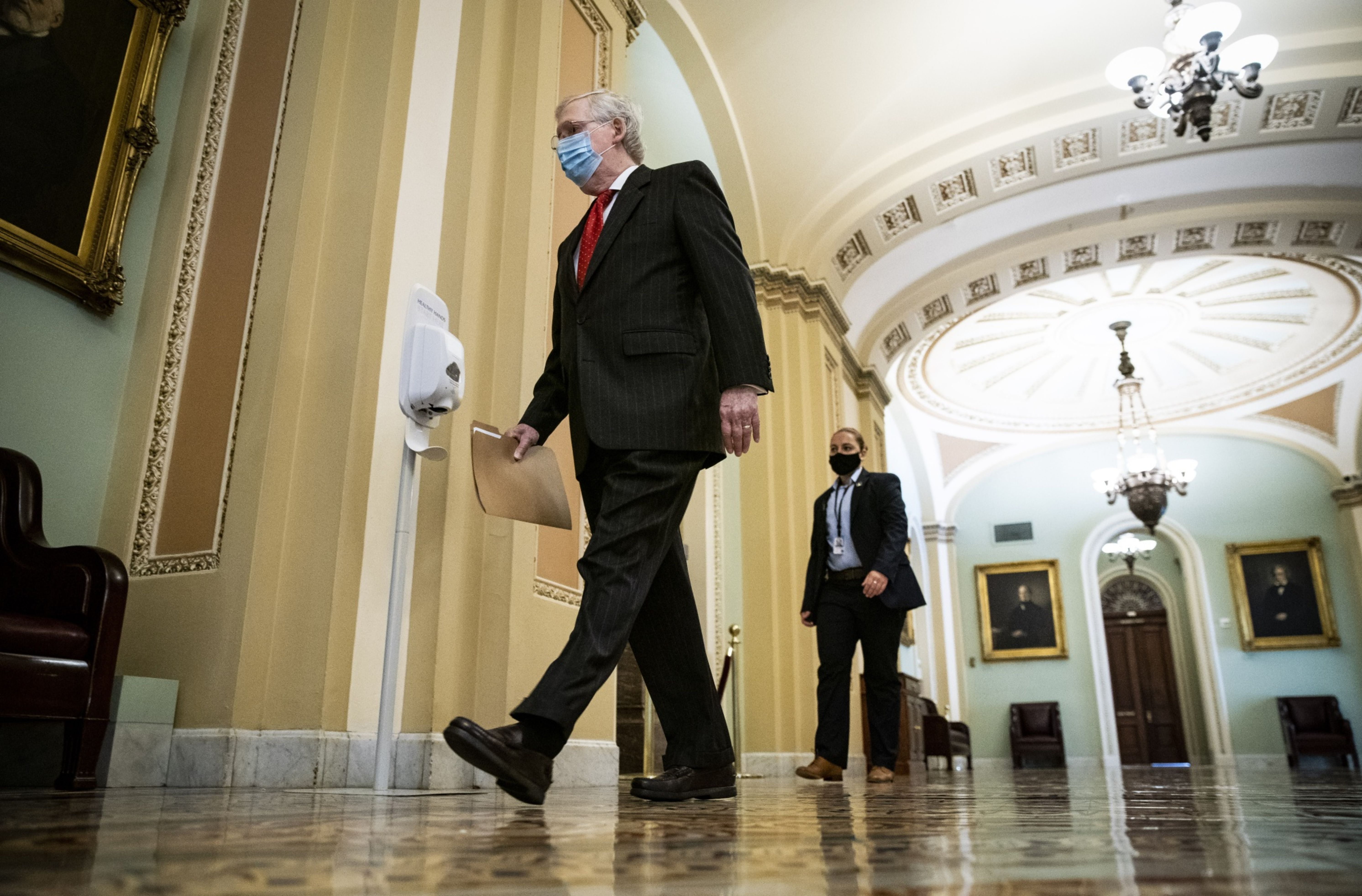Senate Republicans presented their $1 trillion plan to bolster the pandemic-ravaged U.S. economy in a series of bills that would trim extra unemployment benefits, send $1,200 payments to most Americans, and shield businesses, schools and other organizations from lawsuits stemming from coronavirus infections.
The $1 trillion package was pulled together after days of negotiations between Senate Republicans and President Donald Trump’s emissaries that didn’t completely settle differences within the GOP over the size and scope of additional federal spending in response to the pandemic.
“We have one foot in the pandemic and one foot in the recovery,” Senate Majority Leader Mitch McConnell (pictured) said Monday on the Senate floor, noting the rising death toll and a fragile economic recovery. “The American people need more help, they need it to be comprehensive, and they need it to be carefully tailored to this crossroads.”
The bill introductions are just the first step toward negotiating a compromise plan with Democrats, who’ve offered their own $3.5 trillion stimulus plan. Congress has little time to act: supplemental unemployment insurance is expiring and other elements of the last stimulus legislation are beginning to dry up.
Lawmakers are set to leave for an August break in two weeks and will be facing a timetable compressed by the looming November election when they return in September.
Kicking off negotiations, House Speaker Nancy Pelosi and Senate Democratic leader Chuck Schumer are scheduled to meet in her office with Treasury Secretary Steven Mnuchin and White House Chief of Staff Mark Meadows Monday evening.
Diane Swonk, chief economist at Grant Thornton, said Congress is “chasing a moving target” with stimulus bills.
“I fear COVID will cast a long shadow on the economy and the aid Congress is offering up is too little too late,” Swonk said. “The bankruptcies and failures that will mount could leave us a much smaller and fractured base from which to rebuild.”
Continuing dissent among Republicans makes McConnell’s negotiating position more difficult.
“There is significant resistance to yet another trillion dollars,” Republican Senator Ted Cruz of Texas told reporters. “As it stands now I think it’s likely that you’ll see a number of Republicans in opposition to this bill and expressing serious concerns.”
There also was a split between the White House and Senate Republicans. Meadows had suggested that Congress pass a much smaller package of school and unemployment benefits and continue negotiating a larger plan through August. McConnell’s statement that the bill had to be comprehensive was a rejection of that position.
Schumer called the GOP effort to put together a package a “slow-motion train wreck” that has delayed getting legislation through Congress.
“They can’t even put one bill together, they are so divided,” he said.
There are some areas of common ground between Democrats and Republicans. Both agree on sending another round of stimulus payments to individuals, though Democrats want to increase the amount paid to dependents and expand eligibility. The Paycheck Protection Program for small businesses is another measure that both parties support and is all but assured will be in the final bill.
Republicans have agreed to extend supplemental unemployment benefits, but they propose cutting supplemental unemployment benefits to $200 weekly from $600 until states are able to create a system that would provide 70 percent of a laid-off worker’s previous pay up to a state-set cap, according to two people familiar with the plan.
Schumer said tying the payments to actual wages will be “unworkable” for most state unemployment systems, which had trouble distributing the flat $600 payment that was part of the March stimulus bill.
The GOP plan also includes money for virus testing and to help with distribution of an eventual vaccine, as well as aid for schools.
Two of the biggest fights ahead are likely to be over two issues that are key for both sides: Democratic demands for aid to states and a GOP measure that provides protection against lawsuits stemming from coronavirus infections when businesses and schools reopen.
— With assistance from Steven T. Dennis, Laura Davison, Mike Dorning and Christopher Condon